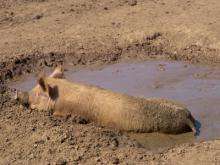May 2, 2011 report
Wallowing in mud is more than just temperature control

(PhysOrg.com) -- While it is well accepted knowledge that pigs wallow in mud in order to regulate body temperature and keep cool, a new study published in Applied Animal Behavior Science shows that the wallowing behavior holds much more than that.
Marc Bracke from the Wageningen University and Research Centre led the study and looked at 66 different studies that had been carried out on the wallowing behavior in pigs and other wallowing species of mammals. The research looked at different theories such as temperature regulation, parasite removal, and sun protection.
Bracke determined that temperature regulation seems to be the main motivation for wallowing; he also found that even in colder weather, pigs will still wallow in the mud. While pigs have very few sweat glands, the mud is the best way to regulate their temperature as the cool water evaporation through the mud is slower than if they just took a dip in cool water. While many have believed that pigs wallow in the mud because of a lack of sweat glands, Bracke believes that pigs and other wallowing animals did not evolve functional sweat glands because wallowing was a part of their lifestyle.
Pigs are genetically related to animals such as hippos and whales. Bracke believes that this wallowing behavior and the desire to be in shallow, murky water could have been a step to the evolution of whales and other marine mammals from land-dwelling mammals.
Bracke also points out that the wallowing behavior of pigs contributes to their wellbeing and that farmers who do not provide wallowing areas for pigs are creating serious animal welfare issues. Similar to farmers who have eliminated foraging from other farm animals have seen welfare issues such as feather pecking and tail biting; Bracke believes the wallowing of pigs is a necessary action for their wellbeing.
More information: Review of wallowing in pigs: Description of the behaviour and its motivational basis, Applied Animal Behaviour Science, Volume 132, Issues 1-2, June 2011, Pages 1-13 doi:10.1016/j.applanim.2011.01.002
Abstract
Wallowing, i.e. coating the body surface with mud, is a natural behaviour of pigs, commonly observed in feral pigs and wild boar, but rarely provided for in current housing systems for domestic pigs. Furthermore, in welfare science the subject has not been receiving much attention.
This paper reviews wallowing in pigs and related species. The behaviour is described and its motivational basis is examined. Underlying the review was a literature search for scientific citations. In total 48 papers were identified containing citations about wallowing behaviour in pigs and wild boar, and 12 papers contained citations about wallowing in related species. Wallowing is observed in many related species including rhino's, elephants, bovids (e.g. American bison) and deer. Pigs also share several taxonomic characteristics with water-loving mammals such as water buffalo's, hippo's and whales. The common perception is that pigs wallow mainly for cooling, sunburn protection and the removal of ecto-parasites. Little scientific evidence exists for other functions than thermoregulation. Pigs lack functional sweat glands and wallowing in mud is an effective behavioural control mechanism in pigs to prevent hyperthermia. Wallowing, however, may also serve other functions, e.g. in scent-marking and sexual behaviour. In addition, wallowing in pigs, like dustbathing in poultry, may be indicative of positive welfare and, perhaps, the performance of the behaviour is ‘hardwired’ and rewarding in itself. If so, wallowing could be an important element of a good life in pigs.
© 2010 PhysOrg.com
















